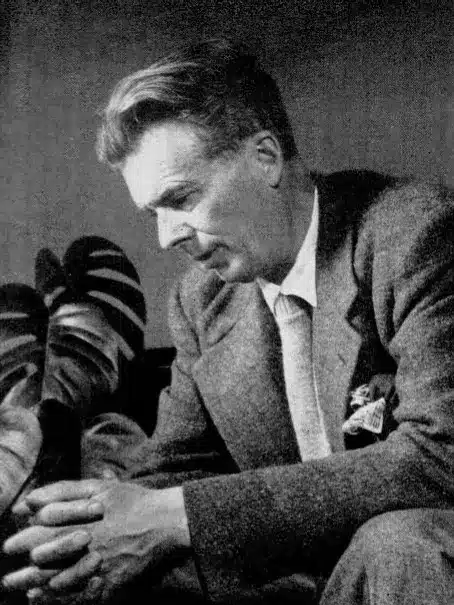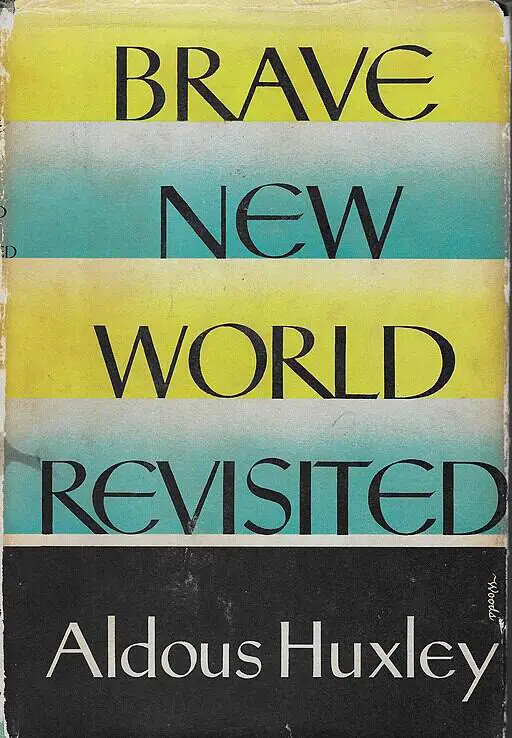Topics to Learn English – Brave New World language, summary, themes, & much more.
Table of Contents
Brave New World is a dystopian novel written by the English author Aldous Huxley in 1931 and published in 1932. It imagines a futuristic World State where people are genetically engineered, socially conditioned, and divided into castes. The novel explores themes of technology, control, freedom, and individuality, making it a powerful text for discussion in English learning contexts.
Who is Aldous Huxley

Aldous Huxley (1894–1963) was a British writer and philosopher best known for his novel Brave New World. He came from a family of scientists and intellectuals, which influenced his interest in both science and society.
Huxley wrote novels, essays, and even screenplays, often exploring ideas about technology, freedom, and the future. His works continue to spark discussion about how science and culture shape human life.
Why use Brave New World in ESL/EFL learning?
- It introduces rich vocabulary related to politics, science, and society.
- The novel raises debate-worthy topics for speaking and writing practice.
- Huxley’s style helps learners see how complex ideas can be expressed clearly in English.
Brave New World Summary

Brave New World by Aldous Huxley is a dystopian novel set in a futuristic “World State,” where people are genetically engineered and conditioned for their roles in society.
Happiness is maintained through consumerism, entertainment, and a drug called soma. Individual freedom, family ties, and emotional depth are sacrificed for stability and control. The story follows Bernard Marx and John “the Savage,” whose struggles highlight the conflict between individuality and conformity.
Themes in Brave New World
- Control and Stability: The government eliminates individuality to maintain order.
- Technology and Power: Science is used to manipulate human life rather than improve it.
- Loss of Individuality: People are conditioned to fit their caste, leaving little room for personal choice.
- Consumerism: Happiness depends on buying and consuming rather than inner fulfillment.
- Freedom vs. Happiness: The novel asks whether true freedom can exist in a society built only on comfort and pleasure.
Brave New World Language and Its Role
Language is central to Huxley’s vision of the World State. Instead of being a tool for free thought and creativity, language is used to control people’s minds and emotions.
- Slogans and Propaganda: Short, repeated phrases such as “Community, Identity, Stability” are used to remind citizens of their duties and keep them obedient.
- Hypnopaedia (sleep-teaching): People are taught phrases in their sleep until they believe them without question. For example, “Everyone belongs to everyone else.”
- Limiting Expression: Language is simplified so that people cannot easily express deep emotions, rebellion, or independent ideas.
- Replacing Old Literature: Classic works like Shakespeare are banned, because their rich language might encourage people to think critically or feel too deeply.
In this way, Huxley shows how language can be a tool of power — shaping thought and limiting freedom.
Suggested Topics and Activities
- Aldous Huxley – Biography
Learn about Huxley’s life, education, and other works.
Example Activity: Create a short timeline of his life events in English.
→ Read Aldous Huxley’s Biography - Understanding Brave New World
Summarize the plot and identify the main characters (e.g., Bernard Marx, Lenina Crowne, Mustapha Mond, John “the Savage”).
Example Activity: Match characters with their roles in the story.
→ Read more about the novel - Key Quotes by Aldous Huxley
Discuss famous lines such as “Words can be like X-rays if you use them properly—they’ll go through anything.”
Example Activity: Paraphrase quotes in simpler English and explain their meaning.
→ Quotes by Aldous Huxley - Themes and Vocabulary
Introduce words like dystopia, conditioning, hierarchy, utopia, totalitarianism.
Example Activity: Fill-in-the-blank sentences using these words. - Other Literary Works
Compare Brave New World with other dystopian novels like 1984 (Orwell) or Fahrenheit 451 (Bradbury).
Example Activity: Small group discussion — Which world would you rather live in, and why?
→ More literary resources
Language Focus for ESL Learners
Reading Brave New World can be challenging for English learners, but it’s also a great way to expand vocabulary. Below are some useful words and expressions from the novel with simple explanations:
- Dystopia – a society that seems perfect but is actually full of problems.
- Conditioning – training or teaching people to behave in a certain way.
- Caste – a social class or group people are born into.
- Soma – a fictional drug in the novel that makes people feel happy and calm.
- Individuality – the qualities that make someone different from others.
- Conformity – behaving the same as everyone else, following rules without question.
- Stability – when society stays calm, without change or conflict.
- Consumerism – the idea that buying and owning things is the key to happiness.
👉 Classroom Tip:
Students can read short passages from the novel and underline unfamiliar words. Then, discuss whether these words describe aspects of their own society today.

